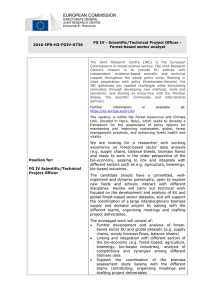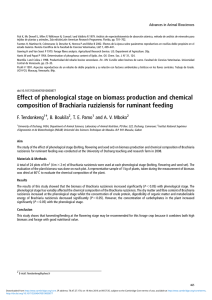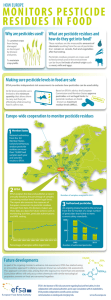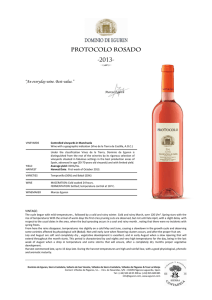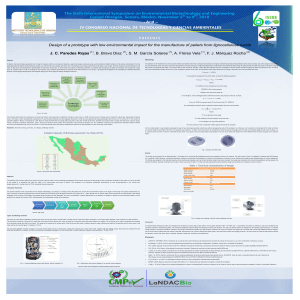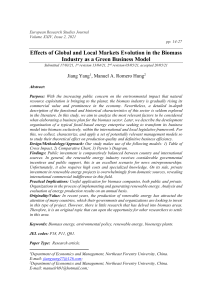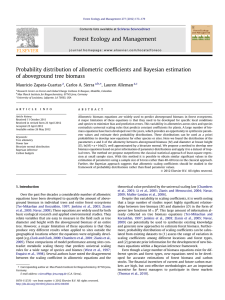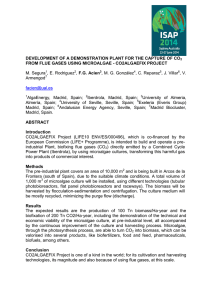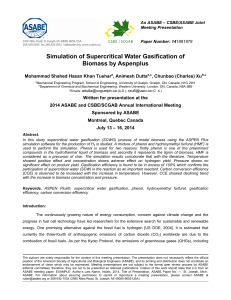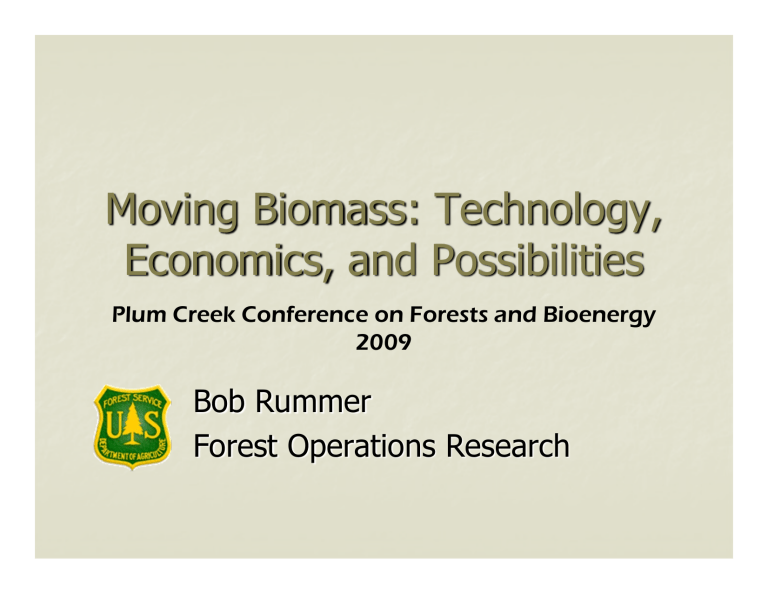
Moving Biomass: Technology, Economics, and Possibilities Plum Creek Conference on Forests and Bioenergy 2009 Bob Rummer Forest Operations Research Outline Some context Forest Operations paradigm Biomass Technology options Economics Ecological impacts and issues Why Biomass? Renewable Energy: Introduction Only possible renewable base load Cellulosic liquid fuels Greenhouse Gas and fossil energy Energy Security Public support/demand for more renewables Developing markets and policy People want it Energy for Our Way of Life Introduction We Want More Renewable Energy! Source: EIA, 2008 Annual Energy Review Introduction New Technology Billions and billions … Introduction Mergers CE industry Biorefinery Deployment DOE Why Biomass? Introduction 1. A reasonable view of the future is increased use of woody biomass for energy Introduction Show me the Biomass! Introduction We’re not in MT anymore Introduction Feedstock Logistics Why is it such an issue? Introduction Cost of feedstock is biggest single cost Operating & Maint Recovery 1 bdt = $70-80Capital electricity Profit Hog Fuel = $36 to 40 bdt delivered Key Points Introduction There is demand for energy from wood There is investment in R&D and production capacity to meet that demand US has significant biomass potential Demand is driven by global factors Feedstock logistics are key to making renewables work Forest Operations Paradigm Forest Operations Existing conditions Desired Outcome Range of Forest Values Forest Operations Paradigm Not just machines … Forest Operations Paradigm A tool for every job Impacts Forest Operations Paradigm Soils People Water Residual Stand Equipment Forest Operations Paradigm Key Points Forest operations produce both future stands and products Complex systems involving human, engineering and ecological constraints Impacts must be addressed Get the right tool for the job Different jobs need different operations Different Biomass Solutions Technology Logging residues Fuel reduction thinning Fuelwood harvesting Understory utilization Short rotation woody crops Stumps Technology: Logging residues Logging Residues 10 to 20% of stand volume left behind conventional product removals Limbs, tops, culls, butt cuts and defect At roadside? In-woods? Concentrated? Large potential existing source Disposal issue “The low hanging fruit” Technology: Logging residues Integrated Recovery Technology: Logging residues 2-pass or 1-pass Rec. Vol Harvest Cost Conventional One-pass w/e-wood Two-pass w/e-wood 50% $10/gt 85% $7.50/gt 84% $9/gt Technology: Logging residues Biomass Product Sorting Separate biomass from other (Delimb) Piling, handling, storage for processing Processing for transport Chipping/grinding Baling/bundling Other conversions Loading and hauling Technology: Logging residues Chipping or Grinding Chipping or grinding capacity Technology: Logging residues Comminution Feedstock and material constraints Technology: Logging residues Work organization Clean Chips Roundwood Fuel Chips Technology: Logging residues Densification www.forestconcepts.com 26 pcf Technology: Logging residues Baling/Bundling JD B380 Biomass Bundler Technology: Logging residues Baling/Bundling Transport density Separates processing and hauling Drying/storage characteristics Production operations in Europe Technology: Logging residues In-woods Processing Technology: Logging residues Forwarding or Skidding Payload = 1/3 solid wood Technology: Logging residues Brush Forwarders Technology: Logging residues Terrain Chipping Technology: Logging residues Composite Residue Logs Technology: Logging residues Fuel reduction Technology: Logging residues Logging Residues Cheapest and easiest to get Co-product of another operation and biomass is NOT the main event Scattered residues are too costly to collect for energy Densifying logging residues is key to reducing costs of handling and transport Technology: Fuelwood harvest Fuelwood harvesting Cutting trees specifically for energy product Thinning or plantation clearcut Short Rotation Woody Crops (SRWC) BCAP Phase II Technology: Fuelwood harvest Small tree felling volume 1600 1400 1200 Vol (dry lbs) Technology: Fuelwood harvest Small trees are … small 1000 800 600 400 200 0 0 5 10 15 DBH (in) 20 25 14.00 12.00 Green tons/hr Technology: Fuelwood harvest Operations Productivity 10.00 7 gt/hr 8.00 6.00 4 gt/hr 4.00 2.00 0.00 0 5 10 15 DBH 20 25 30 Cost $25.00 $20.00 Cost ($/odt) Technology: Fuelwood harvest Cost/ton = f(Prod, Cost) $15.00 $10.00 $5.00 $0.00 0 5 10 15 DBH (in) 20 25 Technology: Fuelwood harvest Fuelwood Technology: Fuelwood harvest Short Rotation Woodys Technology: Fuelwood harvest Fuelwood High utilization of biomass Simplified operations Smaller equipment possible Full cost of operation charged to biomass Piece size Emphasis on high production Woody Feedstocks: Understory harvest Brush and understory harvest Brushlands (TX, MN, NV) Understory biomass (coastal plain) Lower volumes per acre Management value in addition to product value Technology: Understory harvest Photo: BLM, Alturas Technology: Understory harvest Mulched and Towed Technology: Understory harvest Mulched and baled Technology: Understory harvest Brush and understory harvest Recovery volumes are relatively low per acre Material is mixed Questions about nutrient impacts Feedstock Processing Technology: Processing Function of the end use Sizing—chippers, grinders, screens Cleaning—dirt removal, bark Drying—transpirational, compression, heating Pre-conversion—torrefaction, pyrolysis, digestion Roadside Conversion Technology: Processing Mobile reduction Technology: Processing Torrefaction Technology: Processing Field Conversion 2 g tons 1 od ton 1200# Technology: Processing Transport Cost Biomass Transportation Technology: Transport Generally half the delivered cost Payload is key Product form and system affect loading Accessibility with large cube transport can be limiting Technology: Transport Active steering trailer Technology: Transport Stinger-steer Chip Van Technology: Transport 2-stage Hauling Biomass Transportation Technology: Transport Getting to the biomass Compatibility with other mat’ls Maximize payload to reduce cost Logistics efficiency Biomass Technology Technology: Transport Wide range of technical solutions Requirements of user and the forest are the constraints Systems engineering problems Not everything works Economics That’s some cool stuff … but Economics How much does it cost? Costs Machine costs Enterprise costs For a given system, the $/ton is variable Economics Piece size, haul distance, season, etc. Economics Supply Curve Supply Curve $35.00 $30.00 Biomass pays its way--noncompete Cost ($/t) $25.00 $20.00 $15.00 Economics $10.00 Residues—limited by other activity $5.00 $0.00 0.00 50.00 100.00 150.00 200.00 250.00 300.00 350.00 400.00 450.00 500.00 MTons Costs Economics Caution when applying cost numbers Biomass procurement is complex Existing assessments rarely address supply curve issues The cost function is not fixed Technology varies along the curve Market forces rule Sustainability Impacts Key issue of public policy Cut too much volume per acre Cut too many acres Adverse effects of operations Development of Biomass Guidelines Biomass Challenges Summary Manage impacts of biomass removal Develop systems with acceptable ROI for contractors Meet feedstock specifications for advanced biofuels Manage reliable biomass supply Biomass Operations in MT Summary Residue recovery, fuel thinning, forest health projects—a tool for resource management Cost is critical, not all solutions are economically viable

